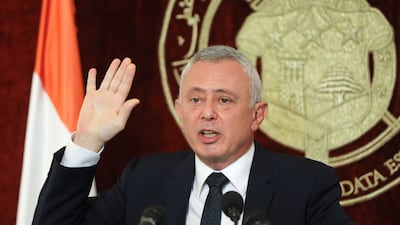On Monday night, Hezbollah leader Hassan Nasrallah publicly announced his support for Suleiman Frangieh as Lebanon’s next president, as the head-of-state vacuum persists into its fifth month.
The 56-year-old has been described as a close friend of Syrian President Bashar Al Assad and, throughout Syria’s brutal civil war, has publicly voiced his belief that the Syrian government will not fall.
The name Frangieh has long been synonymous with the Lebanese political scene and the Christian Maronite confession. The family come from the town of Zgharta, in northern Lebanon.
Over the decades they have led the Marada Movement, a militia during the Lebanese Civil War from 1975-1990 and now a political party headed by Mr Frangieh that has a handful of seats in parliament.
Mr Frangieh’s grandfather, who was also called Suleiman, served as Lebanon’s president from 1970-1976.
As Lebanon’s Christian militias began to splinter in the early years of the war, Mr Frangieh’s father Tony — the commander of the Marada Brigades — was killed in what has since become known as the Ehden Massacre.
More than 30 people died, including Mr Frangieh’s mother, his young sister and bodyguards, when Kataeb gunmen attacked the Frangieh home in Ehden.
Among the Kataeb militiamen sent to carry out the attack was Samir Geagea, who now leads the Lebanese Forces — the current largest party in Lebanon’s parliament — and is opposed to Mr Frangieh’s candidacy.
Mr Geagea has said he was injured before getting to the Frangieh home. In 2018, the two men were publicly reconciled in a move mediated by Patriarch Bechara Al Rai.

The Frangiehs had already been close to the Assad family in Syria but the massacre strengthened those ties.
A 13-year-old Suleiman Frangieh, who was not in Ehden during the attack, was sent to safety in Syria and has since retained strong links with the Assad regime.
Eventually Mr Frangieh would return to Lebanon to take charge of the Marada Brigades. After the war ended, he was elected to Lebanon’s parliament in 1992, 1996 and 2000. Mr Frangieh lost his Zgharta seat in 2005, but regained it in 2009. Since 2018, his son Tony has occupied that seat and has also served in various cabinets.
On Mr Frangieh’s website, he talks of ability to attract “the power of forgiveness and recognition of others”.
Referring to his early years after the killing of his family, he says: “In response to this catastrophic tragedy, Suleiman Frangieh experienced pain but he found relief living with people who granted him their trust, love and loyalty in order to be their young leader.”
Mr Frangieh’s name had been touted for the presidency many times but he never secured enough support to win. For now, while the declaration of support from Hezbollah and its Shiite ally the Amal Movement is important, he is still a long way from the presidential palace that his grandfather once occupied.

